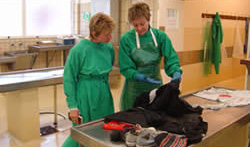The Division of Forensic Medicine and Toxicology comprises a diverse and dynamic group of individuals who are leaders in service delivery, teaching, training, and research.

|

|
Service delivery
Forensic pathologists make up the majority of the academic staff within the Division and are on joint conditions of service between UCT and the WCGHW. They are responsible for the medicolegal investigations of unnatural deaths in the West Metropole of the City of Cape Town and perform about 4500 per annum at the Observatory Forensic Pathology Institute. They are supported by a vibrant team of administrators, typists and interns who assist with post-mortem reports, case-file management and procurement.
The forensic scientists, technicians and graduate interns who are also on joint conditions of service, provide ancillary investigation services to assist in the medicolegal death investigations of cases for the entire Western Cape province. The largest services are currently histopathology and toxicology, with genetics and entomology services building more capacity.
Teaching and Training
The Division teaches at undergraduate and postgraduate level.
The forensic pathologists also provide core teaching to the UCT medical students who rotate through the Division for their Forensic Pathology block in their final year of MBChB. Much of this teaching is conducted at the mortuary, in an authentic environment. Finally, courses are offered to law students, and the Division regularly hosts international scholars each year.
The forensic scientists and scientific officer on UCT conditions of service are primarily responsible for the delivery of the majority of postgraduate programmes, which include the MPhil: Biomedical Forensic Science degree and various BMedSc (Hons), MSc and PhD options. The diverse nature of scientific expertise within the Division allows for multi-disciplinary programmes to be delivered. The Division has dedicated teaching laboratories where practical skills are taught to students. Postgraduate medical training is given to Registrars who are specialising in forensic pathology. There are currently six registrar posts, and the minimum required training is four years, with a mini research project before registration as a specialist.
Research
In addition to service delivery and teaching, the Division has a strong focus on research, particularly that which is translatable and has an impact on public policy and health. Given the diverse team of staff, research extends into various areas, including childhood deaths, the role of drugs in death, molecular autopsies in sudden unexpected deaths, violence and trauma, post-mortem interval determination and human identification.
The Gender Health and Justice Research Unit is a dedicated research group which focuses specifically on violence against women and children. The work of this research group has been pivotal to the implementation of the Domestic Violence Act (DVA). Current research projects within the unit have focused on vulnerable groups (LGBTI) in Africa and developing evidence-based methods to improve the functioning of Sexual Offences Courts and therefore the outcome of gender-based- violence. The Division collaborates extensively with the Medical Research Council (MRC) on the epidemiology of violence and trauma mortality. The Division also collaborated with the UCT Children’s Institute and piloted the first ‘Child Death Review’ initiative in the country, which has now become routinely implemented in the Western Cape.